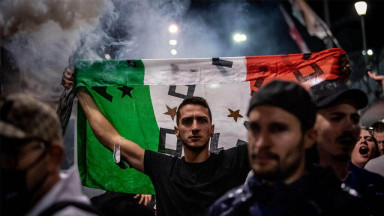Empty stadiums and crowded fixture lists: How football survived the global pandemic
The beautiful game wasn’t spared by the virus as sporting events across the world were affected
By Admin | about 4 years ago
Respiratory mask attached to a football
When COVID-19 wreaked havoc on the planet, the football ecosystem was plunged into uncertainty. As nations across the world entered complete lockdowns, football authorities accepted that the game simply couldn’t go on, especially with crowds present in stadiums. Soon, Euro 2020 got postponed and by 19 March, the Belarusian Premier League was the only active top-flight competition in all 55 UEFA member associations.
The wait that followed was both anxious and hopeful. As weeks passed on and the full scale of the virus’ impact emerged, the evidence seemed to point towards an inevitable crisis. While it was clear COVID-19 would affect practically every single football club, the ones whose very future was at risk were those that played in the lower leagues of Europe.
Image showing leagues in Europe suspended due to coronavirus
Unlike top division clubs, those that play in the lower leagues didn’t have the lucrative broadcasting deals to cushion their fall and were the worst hit by lack of fans at matches. Matchday revenue is essential for these clubs to keep afloat and without it, those in England were forced to rely on government job retention schemes for players and staff during the unprecedented situation. According to BBC, thirty lower-league clubs, including Plymouth Argyle made £300,000 by making tickets for the next season available for the fans to buy.
Women’s football, which was enjoying a rise in popularity and interest, suffered a disproportionate impact due to the sudden stop in sport. According to a survey by FIFPRO Player Unions on the ongoing impact of COVID-19 on women’s football, in 47 percent of the countries involved, women footballers had wages cut or suspended. In 40 percent of countries, players received no mental or physical health support. In 69 percent of countries, communication with players was regarded as poor or very poor. All this makes for grim reading and points towards the disproportionate backing the women’s game has received compared to men’s football.
“Like most industries, women’s football is being severely affected by the impact of the Covid-19 pandemic, and the findings of this survey highlight what we have said from the outset, that both players and the game itself need strategic support to get them through these tough times. To that end, we also identified great cases of innovation and advancement in which new solutions are showcasing the unique potential of women’s football to thrive today and in the future” said Amanda Vandervort, FIFPRO Chief Women’s Football Officer
In Spain, smaller clubs benefitted from the extra revenue generated after the Spanish Football Federation decided to take the Spanish Super Cup overseas. “We have guaranteed 100 percent of the help this year and also for next year,” President Luis Rubiales said.
Footballers in the top five leagues did their part by taking wage cuts and easing the financial burden on their respective clubs. Lionel Messi, the highest-earning footballer, and his Barcelona teammates took a 70% wage cut to make sure the non-playing staff can keep 100% of their wages. Captains of English Premier League clubs came together to set up the ‘#PlayersTogether’ initiative - a fund aimed at supporting the nation’s healthcare service. Mesut Ozil, who was at Arsenal at the time, even stepped in to save club mascot Gunnersaurus from being made redundant.
Footballers made the most of the situation by using the unforeseen and unusual gap in the fixture calendar to spend time with their families and join in for team yoga sessions on Zoom while fans found it tougher to cope with the pandemic without football to look forward to. According to medical experts, COVID-19 has had an enormous impact on mental health worldwide and continues to do so.
THE RESUMPTION
After two more months of waiting, The Bundesliga became the first major European league to restart, on 16 May. In the subsequent weeks, many other leagues announced they would follow suit. La Liga returned on 11 June, the Premier League on 17 June, and Serie A on 20 June. Champions League and Europa League resumed on August 7 and August 5 respectively. Ligue 1 was the only league out of the top European leagues to not resume. PSG were awarded the title.
The restart posed huge challenges in the form of logistics and safety for football authorities and clubs, but the cost of not playing football meant there wasn’t much choice. Footballers were regularly tested during gameweeks and socially distanced training and celebrations were the directives. This meant play could resume but in eerily empty stadiums with the sounds of the ball being kicked and players shouting providing the background. Some broadcasters even piped in artificial and pre-recorded fan noises for the experience to sound closer to the real thing. Europe saw Bayern Munich crowned as its champion for the sixth time, in an empty stadium, bringing hope that football could continue into the next season as well, with or without fans.
Picture Courtesy of : Ailura
An empty Red Bull Arena in Salzburg
The 2020-21 season began in a similar vein as the previous one finished – in empty stadiums. Another challenge that faced the footballers this time was having to adjust to the new and unforgiving fixture calendar. According to premierinjuries.com, there were 103 muscle injuries in the first two months of the Premier League in the 2020-21 season, an increase of 16% in comparison to the same time the previous season. It was mirrored by similar trends across Europe as footballers, young and old struggled with the intensity.
MOVING FORWARD
COVID-19 has tested our individual and collective resolve and continues to do so. It is hard enough having to accept ‘the new normal’ without continuing to live with it.
When it came to football, what didn’t help and was also laid bare by the pandemic was the fundamental flaws in the running of the game. It is no doubt that modern football is as much a business as it is a sport and without money, the game will cease to exist, but the past few years have seen the game shifting away from the latter and towards the former. This belief was reaffirmed on 18 April 2021, when 12 of the richest football clubs announced the formation of a new breakaway league, called the “Super League”.
It is high time football has had an honest and tough conversation about where it goes from here. It needs an economic overhaul that ensures the money from broadcasting is better used to support the lower leagues and grassroots so that they are better prepared to face it if another crisis comes about.
""
We need more concerted action or there is a real danger that progress towards gender equality in parts of world football will be set back years
In the case of women’s football, it is feared that years of progress will be undone due to the crisis. “Women footballers are routinely overlooked in many parts of the world. Yet there are also positive steps by some stakeholders to invest in and support women’s football during the pandemic. We need more concerted action or there is a real danger that progress towards gender equality in parts of world football will be set back years.” said Jonas Baer-Hoffmann, FIFPRO General Secretary, referring to the survey.
The last couple of years have reinforced how big a part football plays in our lives. It can be something that brings people together regardless of socio-economic and even geographical divisions, and at the worst of times (let’s say during a global pandemic) football can be an escape from the worries and suffering. It needs responsible and intelligent heads at the top to make sure it remains the same.











